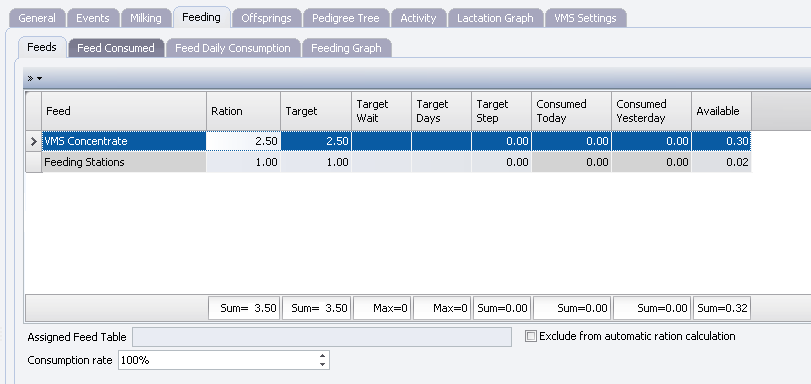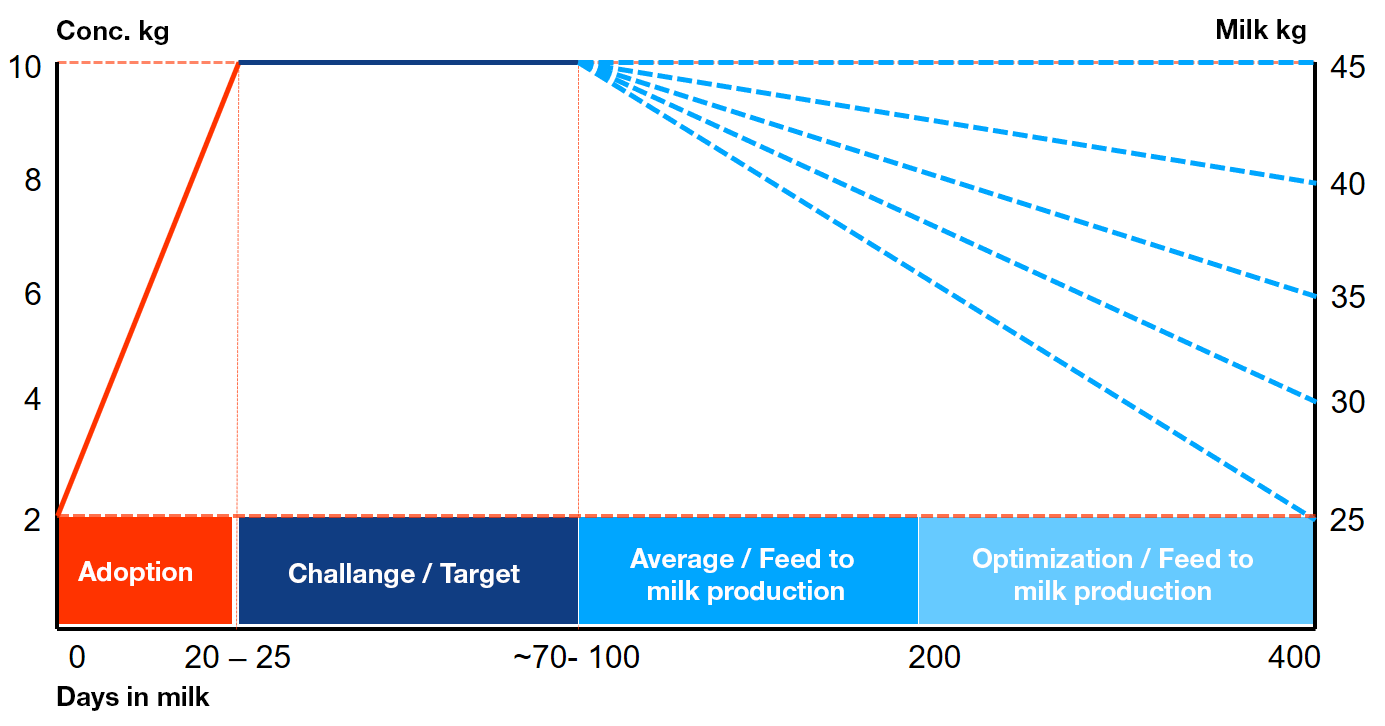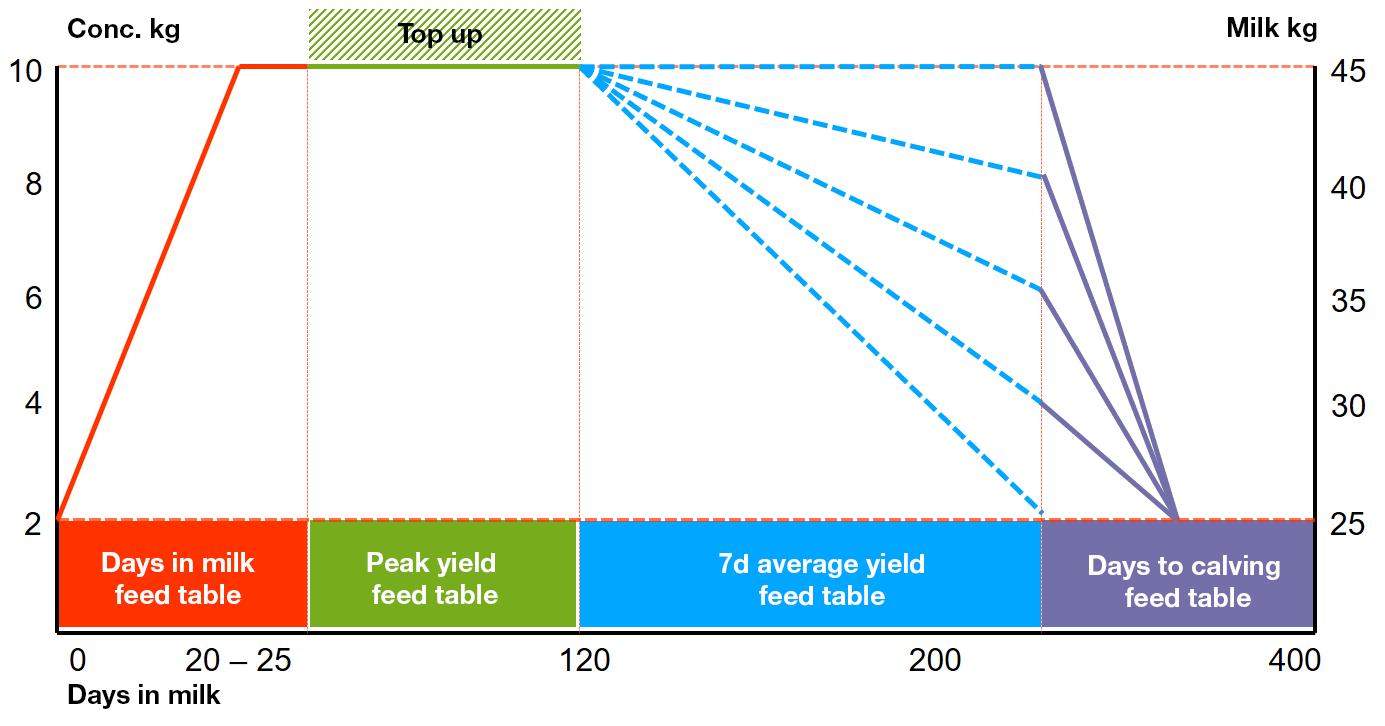
You control your feeding strategy – from calving to dry off with DeLaval DelPro™
Throughout the different stages of lactation your cows require a different feeding approach. DelPro FarmManager is designed in order for you to set a controlled strategy and implement it for differing days in milk, lactation number, production level and animal group. What matters is that we give you the power to accommodate for all these differences; easily and automatically, confident in the knowledge that we do so safely.
Animal card
In the feeding tab of the animal card (Figure 1) you can find the feed rations that are assigned to the animal and you can see the received ration for this animal. It is important to understand the following terms.
 Figure 1: Feeding ration details in the animal card in DelPro FarmManager.
Figure 1: Feeding ration details in the animal card in DelPro FarmManager.
- Ration displays what a cow is receiving on a daily bases in kilogram
- Target show the feed she will receive, within “x” number of days (target days)
- Before a cow can consume feed, feed should be available (available feed increases automatically throughout the day)
In addition to manual or flat rate feeding, we can apply an automated, individual cow production and lactation stage based feeding strategy using automatic feed tables. DelPro FarmManager gives you the possibility to feed the cows according to different principles;
- Age in days
- Days in milk (DIM)
- 7 day peak yield
- 7 day average yield
- Days to calving (DTC)
Challenge feeding
When we feed animals a fixed ration throughout the lactation; a more traditional flat rate feeding, relies on fat mobilization. Challenge feeding on the other hand aims to supply the cow with the nutrients that are needed for the lactation stage she is in at any point in time.
Challenge feeding is common in countries where complementary concentrate feeding is often used and where the vast majority of the ration is based on forage like grass and corn silage. The advantages are that cows can be kept in an ideal body condition, and that each cow is given a fair chance to show her production potential. The incentives for this are considerable. Every liter in peak lactation can result in a higher yield per lactation.
The strategy is divided into different phases related to the different lactation stages.
- Challenge feeding takes place in early lactation (adaption and challenge/target below). It involves every cow, regardless of yield, being given a maximum ration of concentrates 3-6 weeks after calving and is kept at a maximum ration 10 up to 15 weeks after calving. This procedure gives all cows the possibility to show their production potential by not limiting concentrate feed availability.
- The second phase, feeding to average milk production (marked with by the 2 lighter blue in the figure below), starts to takes place at approximately 70-100 days after calving. The cow is fed to match her milk production level. Towards the end of the lactation, the feed can be strategically decreased with the “days to calving” feed table. This strategy means that each cow is fed individually. Feed is saved and the risk of having cows with a too high BCS is reduced.
DelPro can help you with implementing this strategy from calving to dry off and throughout the dry period up to the next calving. You only have to setup your feeding strategy in DelPro FarmManager.
 Figure 2: Schematic overview of a challenge feeding strategy for cows fed an individual based concentrate ration.
Figure 2: Schematic overview of a challenge feeding strategy for cows fed an individual based concentrate ration.
Challenge according to peak yield current lactation
With DelPro FarmManager you can now also set a challenge feed period that adopts according to the cows current performance. We do this by creating a feed table based on peak yield in the beginning of the lactation. Instead of the example above only using a challenge/target approach, fixed for all cows; we evaluate the current peak yield and where it exceeds our expectations increase the ration of the animals. We focus on increasing the ration of animals producing more than expected – this is in the below figure 3 the “top up”. With the peak yield feed table we will not decrease the feed ration in this period (unless you desire to do so slightly). Downwards concentrate adjustment remains to be part of the strategy in the second period – feeding to average milk production.
From calving to calving
Knowing that in different lactation stages, from calving to calving, your cows need to meet specific feed requirements – we made sure that the DelPro FarmManager feeding module covers all needs. The strategy of using different feed tables available in DelPro FarmManager, across the entire lactation from calving to calving, could look from a holistic point of view like figure 3 below. To start the lactation we can implement your build up strategy with a days in milk feed table. Following the build-up we can challenge feed your cows according to their current peak yield with the peak yield feed table. During mid lactation cows are then fed according to their average 7 day yield. And towards the dry period we can build the feed down to minimum levels to naturally dry off the animals. Or build up the concentrate whilst in the dry period towards calving. With this, you can implement the feeding strategy that fits your farm.
 Figure 3: Combined feed tables to cover your feeding strategy from calving to dry off.
Figure 3: Combined feed tables to cover your feeding strategy from calving to dry off.
To take the next step on your personal DelPro journey, talk to your trusted DeLaval representative.